Follow Me
Latest Posts
- Organize Your Desktop with Your Perfect Desk Pad: 2025 Update
- How to Use Timers for Improved Productivity — Part 5: Hybrid Timers and Bonus Material
- How to Use Timers for Improved Productivity and Focus — Part 4: Digital Timers
- How to Use Timers for Improved Productivity and Focus — Part 3: Tangible Timers
- How to Use Timers for Improved Productivity and Focus — Part 2: Pick the Right Timer
Search Best Results Organizing
Subscribe to the Paper Doll Blog via Email
Paper Doll Shares Presidential Wisdom on Productivity
Posted on: February 20th, 2023 by Julie Bestry | 12 Comments
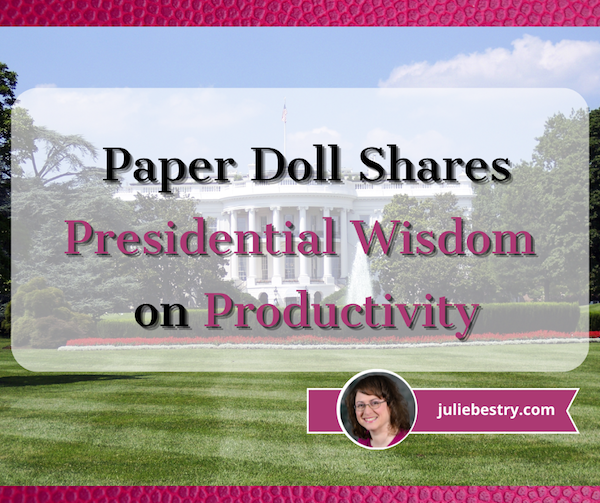
In honor of Presidents’ Day, I thought it might be fun to look at some of the values various US presidents have embraced to help them not only get more things done, but get more of the right things done.
Be assured, this is completely apolitical content. Additionally, let’s agree that we’re all aware of the complicated lives and backgrounds of presidents (particularly those born prior to the 20th century); none of this should be taken as full-on endorsements of them as men (few of whom would compare entirely favorably with Mr. Rogers), but only as people who endeavored to accomplish much.
And I give you a Presidents’ Day guarantee: you will not be encouraged to purchase a mattress anywhere within the text of this post. (That said, the vast majority of presidents who had something to say about productivity spoke robustly on the importance of sleep!)
PUNCTUALITY
People who are on time are dependable. If you arrive on time (or a little early), then those you are meeting need never fear that they are in the wrong place, that they are late, that you met with some misfortune, or that you forgot them.
Being somewhere on time shows respect for the value of other people’s time. It proves that you don’t consider what you were doing beforehand (or whatever made you late) to be more important that the activities of the person you are meeting.
But from a productivity standpoint, punctuality is efficient. If you’re on time, and if everyone else is on time, then you can stick to the agenda without apologies, hurt feelings, or distractions due to late arrivals or missed information.
George Washington was a stickler for punctuality. As a teenager, he carefully read and took notes on more than 100 rules about civility put together by 16th-century Jesuit priests. From there, Washington developed his Rules of Civility and Decent Behavior in Company and Conversation.

While an inordinate number of these would fall under Miss Manners-type advice, like keeping your nails clean and not taking off your clothes in front of company, one particular guiding principle caught my eye.
82. Undertake not what you cannot Perform but be Careful to keep your Promise.
That includes showing up when you said you would.
I’ve heard half a dozen stories about Washington’s keenness for punctuality. Allegedly, he dined daily at 4 o’clock; when he invited senators or representatives to dine with him, if they arrived late, they found the president midway through finishing his meal or even having completed it. “We are punctual here. My cook never asks whether the company has arrived, but whether the hour has come.”
By 21st-century standards, this may seem inflexible. After all, Ralph Waldo Emerson wrote, “A foolish consistency is the hobgoblin of little minds, adored by little statesmen and philosophers and divines.” But the word “foolish” carries a lot of weight here. Habit and ritual have value, and they help presidents and fourth-graders alike to get more done.
Once, Washington’s secretary kept POTUS #1 cooling his heels. The secretary blamed a malfunctioning watch for his delayed arrival. Displeased, Washington replied, “Then you must get another watch, or I another secretary.”
Diplomatic, at least on these occasions, Washington was not. But hewing to strict rules and not letting anyone else mess with his temporal boundaries meant he could accomplish more of what he had planned.
Be assured, I understand that we all have different obligations. A doctor may be running late because a patient earlier in the day had a medical emergency. (Having once been that medical emergency, I am much more sympathetic in this regard.) The person meeting you may lack the (financial and human) resources you have, so when a caregiver or babysitter cancels, or transportation breaks down (or public transportation runs late), it’s important to have some empathy.
And if someone is chronically late (and you’re sure it’s not some kind of narcissistic power play), it may be due to neurological challenges related to any of a variety of executive function disorders or ADHD. Yes, it’s frustrating. And if that chronically late person is you, well, we know it’s frustrating for you, as well. But there’s hope.
Punctuality is often seen as a static personal characteristic rather than a skill set, but you can improve. For example:
- Know how long it actually takes to accomplish your most common tasks. Be realistic.
- Do not over-schedule yourself. Ever brain needs time to refresh and re-set.
- Schedule buffer time, recuperative time, and travel time. If you don’t schedule time to transition between tasks and/or locations, you are likely to fall further behind. In middle and high school, we called it “passing time,” as you had to pass from classroom to classroom. Do not engage in the magical thinking that you can start one meeting or appointment at the same time you are ending another one, even when video conferencing. Try the therapy model of 50-minute hours when scheduling Zooms.
- Don’t depend on willpower. Your lateness is likely not because of laziness but attempting to do “just one more thing.” Curbing that instinct will take effort and support.
- Set alarms. When the time is up, the time is up. For some people, it can be emotionally uncomfortable to stop and transition, but consider the emotional discomfort both you and the other person will experience if you are late.
- Accept/request help from others to move you along.
If all you remember of Washington is false teeth and cherry trees, you might enjoy reading You Never Forget Your First: A Biography of George Washington by Alexis Coe. It’s less worshipful than other biographies (or Christopher Jackson’s portray of General Washington in Lin-Manuel Miranda’s Hamilton), but it’s compelling reading.

BACKUPS, OPEN TABS, AND SWIVEL CHAIRS
Whatever one might say about Thomas Jefferson (good, bad, or … let’s be real, it’s never indifferent), there’s no getting around the fact that the guy loved his gadgets for getting things done.
Jefferson wrote a lot of letters; historians estimate that he sent approximately 20,000 letters over the years to friends, family members, and colleagues, not even counting official diplomatic or presidential correspondence. (He also wrote some nasty poison-pen newspaper editorials under false names.)
Nowadays, to keep track of our email trail, we might thread the conversations, or sort by sender, or develop complex archiving and tagging systems. Thomas Jefferson made use of a polygraph.
No, not that kind of polygraph. This isn’t an episode of Law & Order: Monticello.
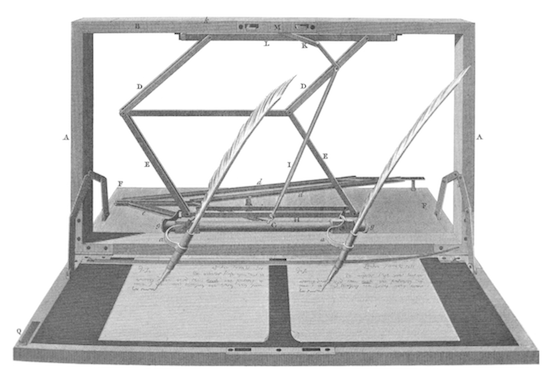
Annotated engraving of Hawkin’s Polygraph from Rees’s Cyclopædia, ca. 1820
Over the years, Jefferson acquired increasingly refined versions of a polygraph device that allowed creation of simultaneous copies of the letters he wrote — as he moved the pen, another pen, on another sheet of paper, wrote in parallel. He needn’t be attended by a secretary, nor did he have to worry about the security and privacy of his letters. Thomas Jefferson made use of a low-labor method of backup.
Jefferson also understood that — in an era before Google, 2-day delivery, or Boolean Search — having quick access to his resources helped him research and write more quickly. He oversaw the creation of a revolving bookstand, modeled on a sheet music stand, that allowed him to access any five books at once with a simple spin. You can even purchase a table-top model from the Monticello store.
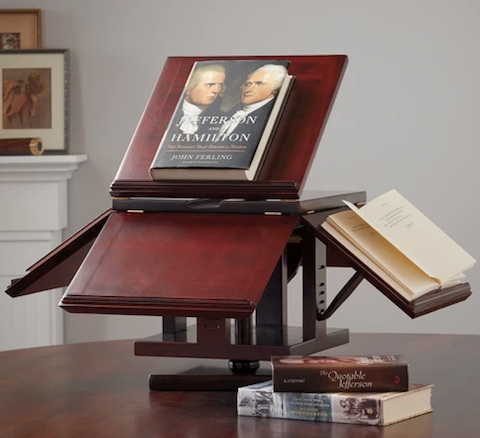
While I’m loathe to promote multitasking, unlike our modern browsers, at least his number of open tabs was limited to five!
And that’s not the only way he set his productivity in motion — Jefferson invented (some say “refined”) the swivel chair! While drafting the Declaration of Independence, Jefferson used the popular and oh-so-British Windsor chair. (You’d recognize one immediately — a wooden seat with four legs attached below and a bunch of wooden spindles slotted into the seat from above form the back of the chair.)
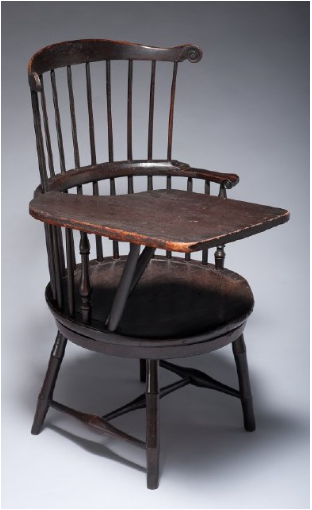
Jefferson Swivel Chair
The traditional Windsor chair was too confining. Jefferson added an iron spindle between the top and bottom halves of the seat, enabling the chair to rotate on doohickeys he repurposed from window sash pulleys! Later, he replaced the original legs of the chair with bamboo ones and added a writing desk. Considering the writing desks are ubiquitous in college classrooms worldwide, this was quite a special invention.
For what it’s worth, productivity-wise, Thomas Jefferson was also a proponent of rising early, stating, “Whether I retire to bed early or late, I rise with the sun.” While Paper Doll doesn’t personally abide by the notion of The 5 a.m. Miracle, Jefferson’s consistency in his schedule — rising early, hosting a hearty breakfast for his guests, and spending the morning writing letters to get his creative juices flowing before working on other projects — reflects the same kind of time blocking that we know helps people build successful productivity habits.
How can you put Jeffersonian wisdom to work?
- Back up everything so you always have a safeguarded copy. For tips, look at Paper Doll’s Ultimate Stress-Free Backup Plan.
- Experiment with ways to keep your resources front-and-center. That doesn’t mean letting your mess pile up. Earmark part of a shelf next to your desk for resources supporting projects you’re working on right now. For digital resources, embrace technology that makes your resources easily searchable, like Evernote.
- Develop consistency in your own schedule by creating blocks to ensure there’s ample time to accomplish what you most value.
EFFICIENCY VS. EFFECTIVENESS
If his diaries are any indication, John Quincy Adams, our sixth president, really understood the paradoxical nature of how some people, although working very hard, often fail to achieve their goals.

Before he was even president, John Quincy Adams was Secretary of State, and of that period of this life, he said with dismay,
Every day starts new game to me, upon the field of my duties; but the hurry of the hour leaves me no time for the pursuit of it, and at the close of my Career I shall merely have gone helter skelter through the current business of the Office, and leave no permanent trace of my ever having been in it behind.
He saw that without foresight and planning, without identifying the most worthy pursuits, he would be busy without being productive.
Even in John Quincy Adams’ early years, he bemoaned,
I find it easy to engage my attention in scientific pursuits of almost any kind, but difficult to guard against two abuses — the one of being insensibly drawn from one to another, as I now have from Chronology to Astronomy and from Astronomy to Logarithms — the other of misapplying time, which is essential to the business of life; public and private.
Long before we talked about “going down the rabbit hole” as we surfed the internet, linking from article to article, or followed social media links hither and yon, JQA recognized how easily time can control us if we don’t seek to control it, or at least our use of it.

Vintage Alarm Clock (Public Domain)
He admonished that we should wisely plan our time to include what is necessary for our work, appealing for our personal interest, and meaningful for our personal and professional growth. To that end, you might:
- Identify what are your highest priorities (whether they are externally-driven, like a paycheck or attention from prospective clients, or internally-driven, like gaining a deeper understanding of a subject or investing in your physical health).
- Time-block for the categories of your life/work so nothing vital will fall through the cracks.
- Take note of your bad habits and work on improving your good ones to give yourself more focus on those higher priorities. Check Paper Doll Helps You Find Your Ideal Analog Habit Tracker to see ways to do that.
- Set alarms or plan catch-up calls, or use accountability methods to make sure you’ve maintained focus and haven’t strayed. For useful guidelines:
Paper Doll Sees Double: Body Doubling for Productivity
Paper Doll Shares 8 Virtual Co-Working Sites to Amp Up Your Productivity
Flow and Faux (Accountability): Productivity, Focus, and Alex Trebek
PLANNING AND PREPARATION
AND PREPARATION
“Give me six hours to chop down a tree and I will spend the first four sharpening the axe.”
This is a phenomenal quote, portraying the importance of facing every problem by focusing on planning, preparation, and identifying the right resources.
Unfortunately, just as with Washington’s cherry tree, Abraham Lincoln never actually made this statement. It was, apparently, an old loggers’ saying, fitting in with folksy wisdom like “measure twice and cut once.” Although it’s often been erroneously ascribed to Lincoln, the quote first appeared in an agricultural education textbook in the 1950s and the first association with Lincoln came in 1960, ninety-five years after his fateful night at the theater.
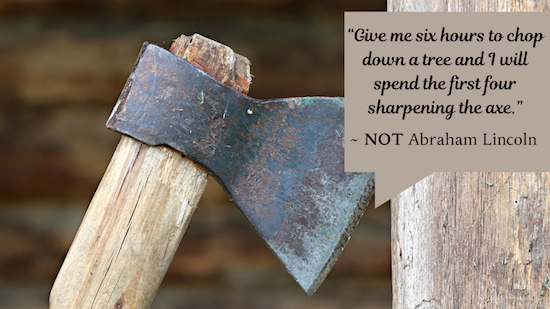
And you may have heard the so-called quote as minutes instead of hours. As a 21st-century suburbanite, I’ve no idea how long it should take to chop down a tree. But even though we have no reason to believe Lincoln said this, we would not be surprised that he might agree with it. Nor do I imagine he’d take umbrage with a quote from a similar 1901 comment in “The Times and Young Men” by Josiah Strong:
He will see that the necessary time spent in preparation for his life-work is better spent than as if he had rushed into it ill-prepared. Time spent in sharpening the axe may well be spared from swinging it.
Honest Abe didn’t ignore concepts of time and project management. In his first inaugural address (in 1861), he said,
Nothing valuable can be lost by taking time. If there be an object to hurry any of you, in hot haste, to a step which you would never take deliberately, that object will be frustrated by taking time; but no good object can be frustrated by it.
This was not a call for procrastination. Certainly, he was talking about caution on the precipice of Civil War. But the lessons from both the real quote and the false one are the same. We must be cautious and consider our situation. So:
- Add planning time to your days, perhaps the last 15 minutes of each workday, to check the next day’s schedule and verify that you have all of your essential resources (whether that means Zoom links or a child’s cardboard Medieval diorama for school).
- Add planning time to your weeks. Laura Vanderkam is a proponent of planning the next week on Friday. So is Paper Doll.
- Build review time into your years so that you have a better sense how your dreams and visions measure up against your realities. Review Organize Your Annual Review & Mindset Blueprint for 2023.
I should note, Lincoln is also alleged (probably erroneously) to have said, “The best thing about the future is that it comes only one day at a time.”
This notion is one we should embrace as we seek to be more productive. We don’t need to be fearful, overwhelmed, or cowed by what is coming. We have time to plan.
The future isn’t a cartoon anvil or speeding train, but a knock on the door each morning. If we schedule time to work on something a little bit every day, whether it’s a 10th grade Social Studies report or a presentation for work, Pomodoro-by-Pomodoro, bit-by-bit, we can achieve our goals.
PRIORITIZING
Often, the problem isn’t that we aren’t getting things done, but that we’re not getting the right things done. This happens when we treat every sensory input as urgent and important, even though it might be only one or the other — or neither.
Before Dwight D. Eisenhower became the 34th president, he was a 5-star general in the United States Army. (Trivia note: only 5 people have ever held this rank, which has now been eliminated. But they didn’t become presidents, so you won’t be tested on their names today.) We can be fairly sure this was a guy who needed to manage his time well.
In a 1961 address after he left office, Eisenhower said,
Who can define for us with accuracy the difference between the long and short term! Especially whenever our affairs seem to be in crisis, we are almost compelled to give our first attention to the urgent present rather than to the important future.
He also reflected these thoughts in his first presidential term when he quoted a university president (whose name has been lost to history), saying,
I have two kinds of problems, the urgent and the important. The urgent are not important, and the important are never urgent.
While this may have (mostly) been true for the university president, it was almost assuredly not quite that simple for Ike. However, by championing evaluation all of those sensory inputs before taking action, Eisenhower inspired many, including Stephen Covey of The 7 Habits of Highly Effective People fame.

Covey took Eisenhower’s wisdom and distilled it into an easily-understood, accessible chart to help you:
- pause and consider the value of a task or situation
- avoid giving urgency a leg-up on importance
- drop-kick the fluff and time-wasters from your life, habits, and schedule, and
- help clear your mind so you can focus on your real priorities
Covey gave Eisenhower the credit. Unlike the Lincoln quote, it’s not made up from whole cloth, but the Eisenhower Decision Matrix (also known variably as the The Urgency-Importance Matrix, The Eisenhower Method, yadda yadda) is really the work of Covey.
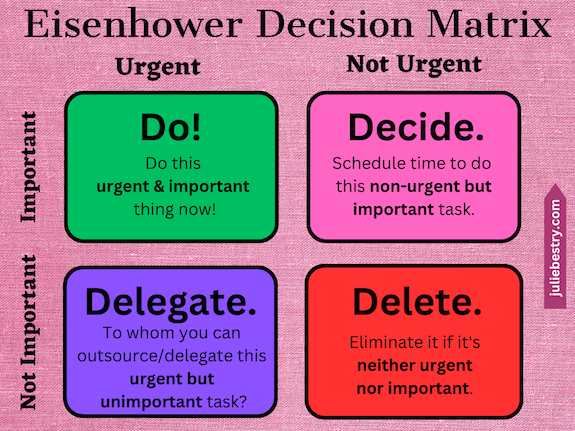
Importance is something that has a high degree of value in terms of whether it helps you achieve your goals, particularly long-term. Note: some things are important but not important enough for you to do them!
Urgency refers to the speed at which it must be dealt with to avoid unfortunate circumstances. True urgency means fire, flood, smoke, blood, or a lawsuit waiting to happen. Things aren’t urgent just because someone is yelling.
True urgency means fire, flood, smoke, blood, or a lawsuit waiting to happen. Things aren't urgent just because someone is yelling. Share on X- Urgent and important tasks will have a high impact on the achievability of your goals and must be competed with alacrity. They have quickly-approaching deadlines. Do them!
- Important but not urgent tasks require you to stop — calm down — and start making decisions. Schedule when you can do the task in the future, assuming it’s an important task that you can’t comfortably delegate. Break the task into smaller component elements to make it easier.
- Urgent but unimportant tasks may still need to be completed, but they may not need to be completed by you. The solution can involve anything from outsourcing a task for pay or delegating to an employee, a child, or laterally (to your spouse or co-worker, though you’ll want to call it something that sounds less bossy).
- Neither important nor urgent tasks might be anything from social media (when it’s not part of your job) to keeping up with certain trends. Not everyone has to know the latest TikTok dance or what’s going on with AI.
Of course, as Eisenhower would have understood, the world is in flux. Getting your taxes completed is important (for legal and financial reasons), but is not particularly urgent in July. By April 14th, the urgency is at its pinnacle. Having to use the rest room is urgent, and assuming you do so today, in 2033 you won’t likely reflect on that bathroom visit as important.
The number 10 can be a highly useful way of determining something’s importance. Ask yourself:
- Will this matter in 10 minutes?
- Will this matter in 10 days?
- Will this matter in 10 years?
The Zoom call that seems so important may long be forgotten a month from now, but the dinner with your friend or promised tea party with your child that you blew off to attend it? That could have a long-lasting impact.
The Eisenhower (By Way of Steven Covey) Decision Matrix gives you a framework for evaluating the decisions you make about the way you spend your time and attention. But it’s only a framework. Only you know what you truly value. You are the President of your future.
This post was originally written for Presidents’ Day 2023. Although a few sentences have been tweaked, the timeless advice remains the same.
In these contentious times, I tried to be as ideologically balanced as possible, picking presidents from the 18th, 19th, 20th, and 21st centuries.
I selected one Democrat (Obama), one Republican (Eisenhower), one Democratic-Republican (Jefferson), one unaffiliated president (Washington), and two presidents affiliated with multiple parties. Abraham Lincoln was Republican and re-elected as a National Union candidate, while John Quincy Adams was, at various times, a Federalist, Democratic-Republican, National Republican, Anti-Masonic, and Whig.
This covers all political parties with which elected presidents were affiliated.
Paper Doll Post:




Julie, as always there is so much good in your blog.
I smiled over a couple of your notes – The secretary blamed a malfunctioning watch for his delayed arrival. Displeased, Washington replied, “Then you must get another watch, or I another secretary.”
One of the teachers at a school I worked at was often late – she often blamed a train that blocked her way – the principal reminded her that the train and track were always there and that she needed to get an earlier start to allow for it.
Diane and I have a client in our support group now that when asked why he was starting his project in a certain area stated that he first needed to “sharpen his saw” before moving on.
I love your train story. Assume the train will always be there and leave earlier! Thanks for reading and for your kind words!
So much wisdom here from our presidents. No wonder they rose to the top and were able to guide our country!
I took a tour of Jefferson’s home and was amazed by how many things he invented. The man had a tireless curiosity, and came up with lots of inventions that make so much sense. I sort of have a nostalgic feeling for a time when you could solve problems with your hands and some ingenuity (no technological expertise required!).
Couldn’t agree more with the wisdom on timeliness, time blocking, planning, etc. I don’t think there are any perfect people in this world, and I love the way you have celebrated wisdom here.
Happy President’s Day!
I feel the same way. I’ve visited Mount Vernon, but still not Monticello, and I know I’ll be fascinated when I finally see it all. It can be difficult to write a post on presidents, even on a topic this far removed from their personal and political issues, but it was fascinating to research. They faced the same innate problems of time and obligations (if without the technology) as we all do, and their takes are instructive. (And I could have written an entire novel about our most famous non-presidential guy on the money, Benjamin Franklin!)
Thanks for reading!
You always provide a wealth of information in the most interesting ways. I love that about you! I’m glad you opted NOT to take the day off, as you had promised yourself. And instead, you shared with us this wonderful collection of Presidentially-inspired time and productivity concepts.
From Washington’s inflexibility with punctuality, Jefferson’s clever polygraph writing tool, or Eisenhower’s influence on Covey’s work, it’s incredible how the past continues to influence our present in many ways.
Honestly, short of waiting until Election Day 2024, this seemed like the best time to write such a piece, but wow, the trick was culling the research to *only* the size of a typical Paper Doll monster post!
You are so right — our past influences our present and future, because through it all, humanity and the limits of time will always be with us!
Julie, this is fabulous. I loved this trip down history’s lane. These presidents gave us much wisdom.
Thank you! This also makes me think about how much brilliance exists (in history and now) among people who are not famous, who are not in the productivity field, who come up with quotes and solutions and inventions but we never get to hear about them.
What a fun post this was. Beautifully written and such great tid-bits and wisdom of our past Presidents on organizing topics. Thanks for sharing!
It was a fun one to research. Thanks for reading!
This is, as it was last year, a fabulous read. I am struck today by how closely aligned some of my thoughts are with the concept of time, planning, scheduling, and productivity as you put them forth. I hope you put this out every year on President’s Day as I think I will see something new each time.
Thank you so much, Diane. I am hoping that this will be a nice evergreen, at least until Taylor Swift wins on the Swiftie ticket. (At least there are no Whigs around to complain that I JQ Adams didn’t actually get elected on a Whig ticket!)